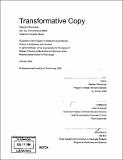Transformative copy
Author(s)
Offenhuber, Dietmar
DownloadFull printable version (12.54Mb)
Other Contributors
Massachusetts Institute of Technology. Dept. of Architecture. Program in Media Arts and Sciences.
Advisor
Judith Donath.
Terms of use
Metadata
Show full item recordAbstract
The ability to create an unlimited number of identical copies is a privilege of digital documents. What if that would not be the case, if each copy of a digital file would go along with some sort of transformation? This thesis examines the implications of such a scenario on information ecologies and map out the design space for a new type of decentralized authoring applications. The concept of the copy is inherently transformative, even if just as the transformation from "the One into the Many ". However, until the recent transition from analog to digital media, the perfectly identical copy was not possible, every reproduction resulted in transformation. While this transformation usually is associated with loss of information, it also creates new information, traces of an objects history. As a result of the ability to create of unlimited numbers of perfectly identical copies from digital files, this dimension of context information is lost - digital files do not have a history. In the course of this thesis, five examples were implemented that illustrate important properties of the concept of transformative copying, in order to propose a general framework for a sociable, transformative file format. They investigate two cases of transformation: First, transformation as a deliberate process by humans. A second dimension is transformation as an autonomous process, either in form of an imperfect copy or as a result of an objects age and usage, such as wear. Both points seem like independent cases, but in our scenario they are closely interconnected and inform each other.
Description
Thesis (S.M.)--Massachusetts Institute of Technology, School of Architecture and Planning, Program in Media Arts and Sciences, 2008. Page 76 blank. Includes bibliographical references (p. 72-75).
Date issued
2008Department
Program in Media Arts and Sciences (Massachusetts Institute of Technology)Publisher
Massachusetts Institute of Technology
Keywords
Architecture. Program in Media Arts and Sciences.